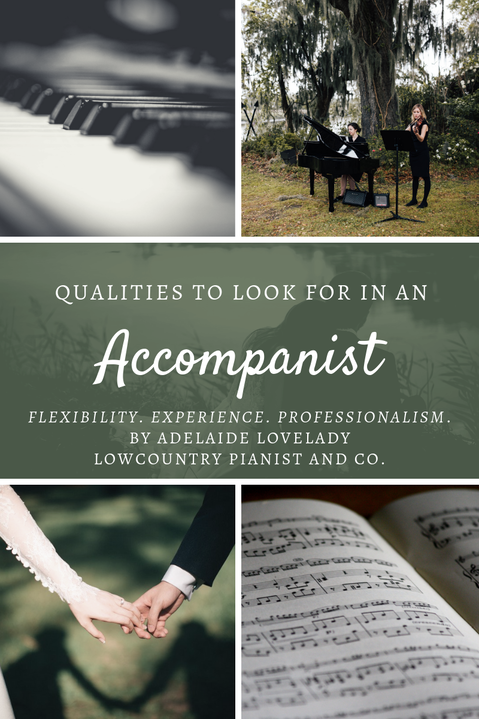|
We’ve all been to those events: one whose ambience is composed of awkward silence in-between music tracks and one that goes above and beyond with its seamless melodic art. You can thank the accompanist for that. Whether it be a wedding, a retirement gathering, or a choral concert, accompanists keep the music going and create the mood for the event. What qualities should you search for in an accompanist? I hope this blog will help you be better prepared when choosing an accompanist by knowing what skills are most important to ensure a smooth performance. Katie Hardwick, choral director at Cane Bay Middle School in Summerville, SC and Rachel Premo, accompanist with Lowcountry Pianist & Company, have shared their professional insight for knowing what to look for when hiring an accompanist for your event!
#1. FLEXIBILITY Accompanists are there for your special day. Whether it be a wedding, an audition, or a party, their goal is to help you in any way they can with their services, namely adapting to how your event unfolds. Katie Hardwick believes some of the qualities found in a good accompanist are, “kind[ness], understanding, dependability, and focus.” To make this easier, Katie suggests that “memorizing large passages, practicing and sight reading frequently” helps sharpen an accompanist's flexibility... Rachel Premo agrees by saying “[accompanists] should be able to be ready on the spot [and] need to be versed in a wide variety of musical styles. [For instance,] playing theatre accompaniment music is very different from playing church choral music.” While these are all great qualities to look for in an accompanist, one of them takes precedence, as it tends to make or break a performance. Both Katie and Rachel believe that the lack of sight reading throws everyone off. Pianists should sight read music frequently in order to increase their flexibility for accompanying. For those who may not know, "sight reading" means to be able to play given sheet music with little to no preparation. Lacking this quality can make for a disjointed performance and most directors cannot afford such lack of professionalism. #2. EXPERIENCE I am not required by my degree to write this blog, however, I know that guest writing proves to future employers that I go the extra mile to gain experience within my field. This can also be said of accompanists and of professional musicians, in general. For instance, Katie has played flute for 13 years and was the principal piccolo player in the college symphony and assistant-principal flute. She majored in Music Education and has "continued to play outside of college in as many ways as [she] can!” Rachel states that she has “been playing piano since the age of eight. When I was a high school sophomore, {I was a] choir accompanist for the first time, I learned quickly that accompanying and solo performing are very different... Since then, I’ve accompanied choirs from middle school up to the professional level. I’ve also played the * full orchestral reduction for twelve different Broadway musicals in performance settings! Learning to play orchestral reductions was another huge learning experience for me when I first did it in college but it prepared me so much for the work I do now." With Rachel's experience, she firmly believes that "the more settings in which you play, the more diverse the skills are that you can add to your tool belt.” Experience builds an accompanist's resume. It gives them an advantage to be the best choice for a someone's special event. Holly Slice, owner of Lowcountry Pianist & Company, recognizes that acquiring experience can sometimes be difficult. She suggests that "pianists gain accompanying experience through volunteering at a local church or a retirement center, and meeting with friends who enjoy singing and practice with them.". Katie discusses this further saying, "I know the notes and how to play them well, but I also understand that it’s not 'going to go my way' as if I were a soloist and everyone was following me. You have to give a little when you are accompanying! The ability to ebb and flow, watch the conductor, listen to the choir, as well as still maintain your musicality and phrasing is challenging. [That is why] I’m so happy I’ve had so much experience doing it!" Regardless of the difficulty, Katie believes that “real world experience is an absolute necessity. The more [an accompanist] experiences these different types of people, the more they will begin to predict every choral conductor, instrumentalist, or singer.” Rachel chimes in, saying, “until you get into that situation, you are not going to learn how to respond and adjust and play what’s necessary at the right time." *An "orchestral reduction" is a piano accompaniment that takes all the instrumental parts for a full orchestra and condenses the notes down into a version that is playable by one pianist. #3. PROFESSIONALISM When we hear the word "professionalism," the majority of us think of a businessperson behind a big desk in a glass office. For an accompanist, however, it is a little bit different. Professionalism is a mixture of “time, dedication, and experience,” says Katie. An accompanist should dedicate time to the craft, because that is what will further propel them. Rachel points out that “having the skill set to play any difficulty of music” is important. "The accompanist should be there to serve the conductors, singers, and performers. A professional accompanist shouldn't expect things to go their way.” With this in mind, flexibility plays a huge role in making this a professional experience. Katie points out that being “well dressed [and having] a positive attitude” takes an accompanist to a new level, and “having this demeanor of ‘I'm here to help’ makes the conductor more willing to listen to their feedback." Professionalism must extend beyond the rehearsal and performance. Katie explains, “I make sure I have several passages memorized so I can look up at the conductor for extended periods of time.” Rachel says, “I practice the accompaniment music on my own... I usually also practice a few of the trickier vocal parts, if there are any places where I think I might need to play the parts for the singers.” Being a professional must go beyond what the director can see!! If your accompanist wants to do well, they will have taken the time to understand what you want for the event. When interviewing accompanists, consider their flexibility, experience, and professionalism to ensure your event goes smoothly and is an enjoyable experience for all involved! With 8 pianists on staff, Lowcountry Pianist & Company accompanists serves SC and surrounding areas. We would be honored to work alongside you for your upcoming event! www.lowcountrypianistcompany.com Instagram: lowcountry_pianist Facebook: Lowcountry Pianist & Co. LLC
1 Comment
|
SERVICES |
COMPANY |
CONTACT |
LEGAL
© 2024 Lowcountry Pianist & Co. LLC
All Rights Reserved.
© 2024 Lowcountry Pianist & Co. LLC
All Rights Reserved.



